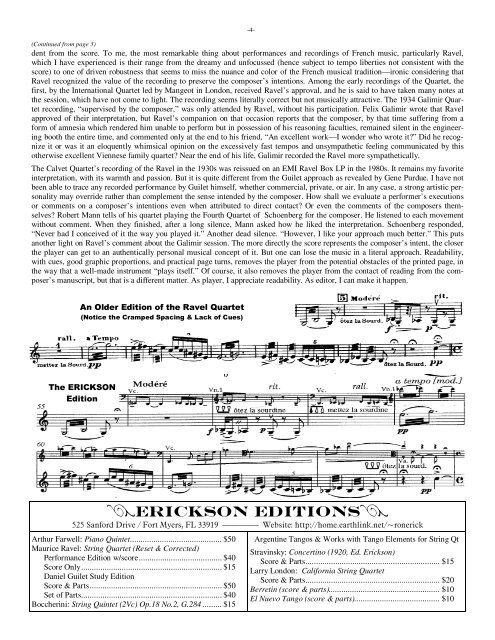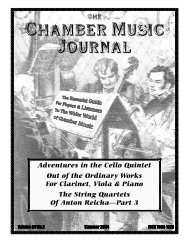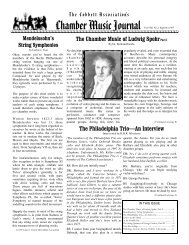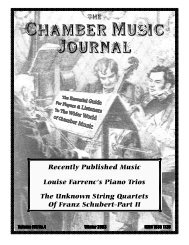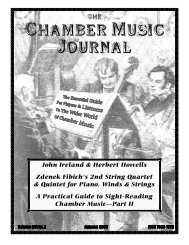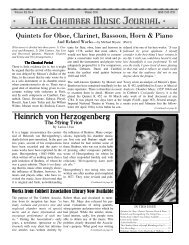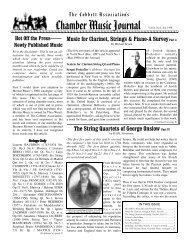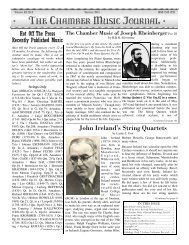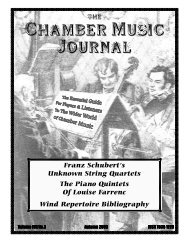Volume 13 No.1
Volume 13 No.1
Volume 13 No.1
You also want an ePaper? Increase the reach of your titles
YUMPU automatically turns print PDFs into web optimized ePapers that Google loves.
-4-<br />
(Continued from page 3)<br />
dent from the score. To me, the most remarkable thing about performances and recordings of French music, particularly Ravel,<br />
which I have experienced is their range from the dreamy and unfocussed (hence subject to tempo liberties not consistent with the<br />
score) to one of driven robustness that seems to miss the nuance and color of the French musical tradition—ironic considering that<br />
Ravel recognized the value of the recording to preserve the composer’s intentions. Among the early recordings of the Quartet, the<br />
first, by the International Quartet led by Mangeot in London, received Ravel’s approval, and he is said to have taken many notes at<br />
the session, which have not come to light. The recording seems literally correct but not musically attractive. The 1934 Galimir Quartet<br />
recording, “supervised by the composer,” was only attended by Ravel, without his participation. Felix Galimir wrote that Ravel<br />
approved of their interpretation, but Ravel’s companion on that occasion reports that the composer, by that time suffering from a<br />
form of amnesia which rendered him unable to perform but in possession of his reasoning faculties, remained silent in the engineering<br />
booth the entire time, and commented only at the end to his friend, “An excellent work—I wonder who wrote it” Did he recognize<br />
it or was it an eloquently whimsical opinion on the excessively fast tempos and unsympathetic feeling communicated by this<br />
otherwise excellent Viennese family quartet Near the end of his life, Galimir recorded the Ravel more sympathetically.<br />
The Calvet Quartet’s recording of the Ravel in the 1930s was reissued on an EMI Ravel Box LP in the 1980s. It remains my favorite<br />
interpretation, with its warmth and passion. But it is quite different from the Guilet approach as revealed by Gene Purdue. I have not<br />
been able to trace any recorded performance by Guilet himself, whether commercial, private, or air. In any case, a strong artistic personality<br />
may override rather than complement the sense intended by the composer. How shall we evaluate a performer’s executions<br />
or comments on a composer’s intentions even when attributed to direct contact Or even the comments of the composers themselves<br />
Robert Mann tells of his quartet playing the Fourth Quartet of Schoenberg for the composer. He listened to each movement<br />
without comment. When they finished, after a long silence, Mann asked how he liked the interpretation. Schoenberg responded,<br />
“Never had I conceived of it the way you played it.” Another dead silence. “However, I like your approach much better.” This puts<br />
another light on Ravel’s comment about the Galimir session. The more directly the score represents the composer’s intent, the closer<br />
the player can get to an authentically personal musical concept of it. But one can lose the music in a literal approach. Readability,<br />
with cues, good graphic proportions, and practical page turns, removes the player from the potential obstacles of the printed page, in<br />
the way that a well-made instrument “plays itself.” Of course, it also removes the player from the contact of reading from the composer’s<br />
manuscript, but that is a different matter. As player, I appreciate readability. As editor, I can make it happen.<br />
An Older Edition of the Ravel Quartet<br />
(Notice the Cramped Spacing & Lack of Cues)<br />
The ERICKSON<br />
Edition<br />
bERICKSON EDITIONSb<br />
525 Sanford Drive / Fort Myers, FL 33919 ————– Website: http://home.earthlink.net/~ronerick<br />
Arthur Farwell: Piano Quintet ........................................... $50<br />
Maurice Ravel: String Quartet (Reset & Corrected)<br />
Performance Edition w/score ....................................... $40<br />
Score Only .................................................................. $15<br />
Daniel Guilet Study Edition<br />
Score & Parts .............................................................. $50<br />
Set of Parts .................................................................. $40<br />
Boccherini: String Quintet (2Vc) Op.18 No.2, G.284 ......... $15<br />
Argentine Tangos & Works with Tango Elements for String Qt<br />
Stravinsky: Concertino (1920, Ed. Erickson)<br />
Score & Parts ............................................................... $15<br />
Larry London: California String Quartet<br />
Score & Parts ............................................................... $20<br />
Berretin (score & parts) .................................................... $10<br />
El Nuevo Tango (score & parts) ........................................ $10


